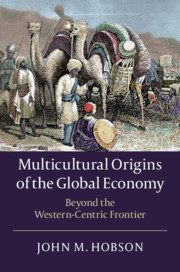Book contents
- Multicultural Origins of the Global Economy
- Multicultural Origins of the Global Economy
- Copyright page
- Dedication
- Contents
- Figures
- Tables
- Acknowledgements
- 1 Mapping a New Global Political Economy
- Part I Multicultural Origins of the First (Historical Capitalist) Global Economy, 1500–1850
- 2 Going Global 1.0
- 3 The Afro-Indian Pivot (I)
- 4 The Afro-Indian Pivot (II)
- 5 Entangled Indo-European Agencies
- 6 Indian Merchant-Financial Capitalists
- Part II What Was Global about the First Global Economy, 1500–c. 1850?
- Part III Empire and the First Global Economy in the Making of Modern Industrial Capitalism, 1500–1800
- Part IV The Second Great Divergence, 1600–1800: Differing ‘Developmental Architectures’ in Global Contexts
- Part V Rehabilitating and Provincialising Western Imperialism: Afro-Asians inside and outside the Shadow of Empire
- Book part
- Bibliography
- Index
6 - Indian Merchant-Financial Capitalists
Navigating beyond the Western-centric Sea Frontier
from Part I - Multicultural Origins of the First (Historical Capitalist) Global Economy, 1500–1850
Published online by Cambridge University Press: 17 December 2020
- Multicultural Origins of the Global Economy
- Multicultural Origins of the Global Economy
- Copyright page
- Dedication
- Contents
- Figures
- Tables
- Acknowledgements
- 1 Mapping a New Global Political Economy
- Part I Multicultural Origins of the First (Historical Capitalist) Global Economy, 1500–1850
- 2 Going Global 1.0
- 3 The Afro-Indian Pivot (I)
- 4 The Afro-Indian Pivot (II)
- 5 Entangled Indo-European Agencies
- 6 Indian Merchant-Financial Capitalists
- Part II What Was Global about the First Global Economy, 1500–c. 1850?
- Part III Empire and the First Global Economy in the Making of Modern Industrial Capitalism, 1500–1800
- Part IV The Second Great Divergence, 1600–1800: Differing ‘Developmental Architectures’ in Global Contexts
- Part V Rehabilitating and Provincialising Western Imperialism: Afro-Asians inside and outside the Shadow of Empire
- Book part
- Bibliography
- Index
Summary
If Indians and Asians had been the leading producers and traders in the first global economy, as chapters 2 through 5 argue, then chapter 6 considers who they were as well as where and how they operated so effectively. It uses the Multānīs as a key example of Indian trading firms that plied the overland caravan routes. This gains added significance because Eurocentrism presumes that the so-called European-dominated High Seas displaced the trade on the overland routes. The chapter places special emphasis on critiquing the Eurocentric model of the Asian pedlar by revealing the rational methods and activities of the large-scale Multānī firms. Indeed, these matched the scale of leading European firms and bankers such as the Rothschilds and Warburgs. And it also problematises the Eurocentric Oriental despotism thesis by revealing the many ways in which the major Asian states—Mughal, Ottoman, Safavid and the Central Asian Uzbek Khanates—provided a highly conducive environment for the Multānī firmsto flourish.
- Type
- Chapter
- Information
- Multicultural Origins of the Global EconomyBeyond the Western-Centric Frontier, pp. 151 - 164Publisher: Cambridge University PressPrint publication year: 2020

